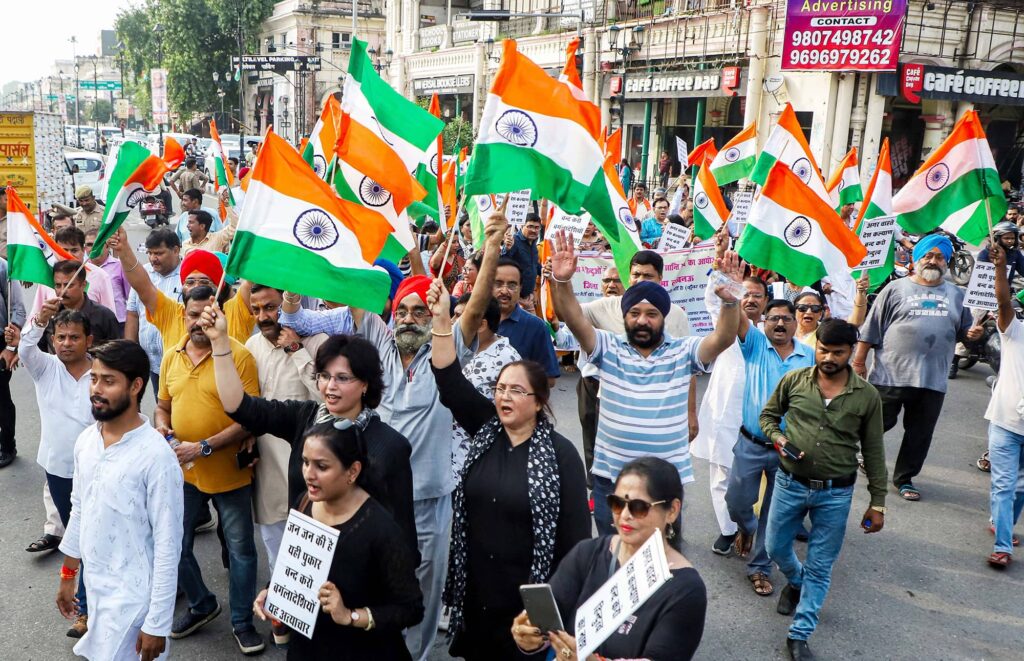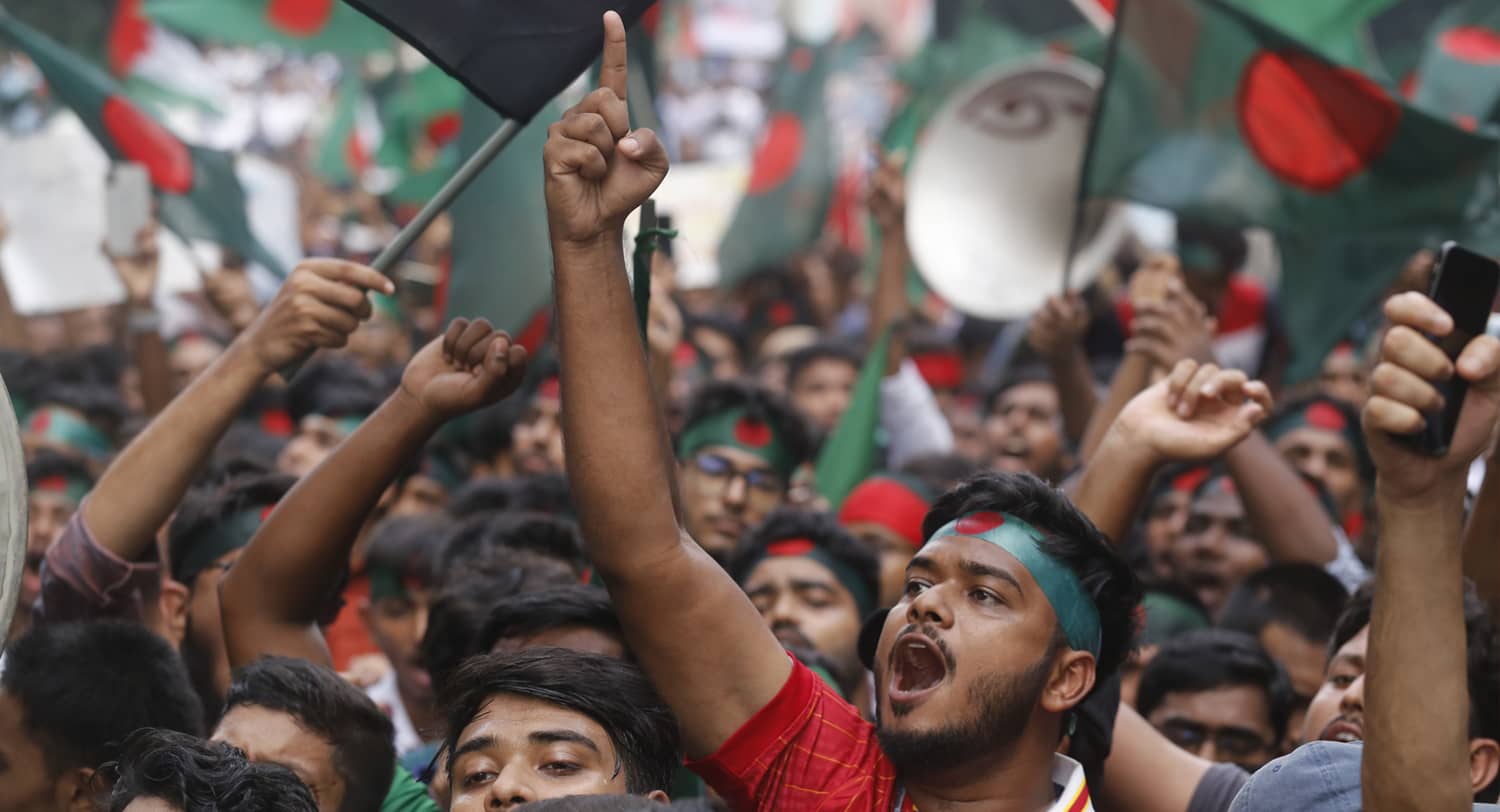This summer country-wide student protests led to an uprising that toppled the government of Prime Minister Sheikh Hasina Wazed and her secular nationalist Awami League political party. Militant Islamist groups have taken advantage of the turmoil to target minority Hindus (and Christians) in Bangladesh. But apopleptic predictions are uncalled for. A better understanding of the country is required in order to gauge the relative strength of the Islamists and other groups.
Bangladesh gained independence from Pakistan in 1971 after a bloody civil war in which hundreds of thousands died. Bangladesh puts the number at three million and calls it a genocide. After a nine-month war, with significant support from India, Bangladesh became free. Mujibur Rahman, who had won provincial elections before the war in December 1970 as leader of the Awami League but then was jailed by the Pakistani government, was released and became Bangladesh’s prime minister.
The Founding Generation
Mujibur Rahman was regarded as Bangladesh’s founding father, but by 1974, his unpopularity had grown. Massive food scarcities, inflation, and flooding had caused disenchantment, and Mujib responded by turning the parliamentary democracy into a presidential one and made Bangladesh a one-party state.
In August 1975, junior officers assassinated him and most of his family, except two daughters who were abroad at that time. Hasina returned to Bangladesh a few years later – she received a warm welcome, and she played a leading role in restoring democracy. She held office for one term, lost the elections that followed, and was back in power in 2008 after a caretaker government oversaw free and fair elections. By most accounts, those were the last free and fair elections in Bangladesh; while she won three more terms, the opposition boycotted elections twice, and disputed the outcome the third time, withdrawing candidates because of widespread allegations of rigging.
The generation that fought for independence has grown old. Nobody questions their sacrifices, but the immediate cause of this summer’s uprising was continued extension of job quotas for them and their progeny – 30 percent of government jobs in a country with massive youth unemployment. This is what brought university students into the streets in protest.
Student Protests, Islamist Violence, Interim Government
Instead of negotiating with the students, Hasina doubled down. She responded with brute force; her police forces shot peaceful demonstrators, and hundreds died. Frustration mounted. While Hasina’s closest ally, India’s Narendra Modi, gave her full backing, she also convinced the West that she alone stood firm against Islamic fundamentalism. If she went, so would secular democracy in Bangladesh—that was her message.
But her rule proved to be increasingly unpopular. The paramilitary Rapid Action Battalion had unleashed a reign of terror, and many dissidents simply disappeared. (Some are appearing from secret prisons telling stories of torture and ill-treatment.) There were extra-judicial killings. Internet censorship increased, and critical newspapers were sued. Islamic fundamentalists attacked secular bloggers, killing nearly a dozen, and sending several rationalist writers and artists into exile. Corruption proliferated, and nepotism thrived. That simmering discontent bubbled over, and in mid-July, Hasina left the country ignominiously.
In the immediate aftermath of Hasina’s departure, violent acts of reprisal occurred. Mobs toppled Mujibur Rahman’s statues and torched his home, now a museum. Islamist groups targeted Awami League politicians and members of the minority Hindu community, many of whom had supported the Awami League. Hindu Hindu temples and private property were attacked. The new Bangladeshi government has said these claims were exaggerated. There were also instances of young Bangladeshi volunteers forming human chains to protect Hindu homes and temples.
The new government is unelected. But it includes civilians known for integrity, with Dr Mohammed Yunus, who won the Nobel prize for making credit accessible to the poorest through micro-credit, acting as the chief adviser to the government.
Others in the advisory group include civil society activists and student leaders. Traditional politicians are conspicuously absent. They are marking their time and will flex muscles when elections will be announced. To earn the trust and maintain goodwill of the people, the interim administration should focus on holding free and fair elections soon, rather than attempt to address Bangladesh’s myriad challenges.

Reaction in India
India’s media has painted a picture of a neighbor in turmoil, where no Hindu is safe, and where the military or Islamic fundamentalists, or an alliance of both, are about to take power. One news anchor imaginatively asserted that the American Central Intelligence Agency had masterminded the uprising, with the US tech industry cheering it on, because Bangladesh was unwilling to offer a base for the US Navy in St Martin’s Island. Some in the Indian media have called Dr Mohammed Yunus, the Nobel laureate who is the adviser to the interim government in Bangladesh, ‘a stooge’ of Hillary Clinton.
This media campaign has only strengthened the resolve among Bangladeshis to strenuously oppose India. Graffiti calling for boycotting Indian products has emerged in Dhaka, Bangladesh’s capital, and reports suggest Bangladesh may renegotiate a rail and road transport corridor which gives India access to Bangladeshi roads in order to reach parts of India’s northeast. Likewise, a power project in Bangladesh which relies on electricity generated by the well-connected Adani group of India, may also get renegotiated.
For Modi, the fall of Hasina represents a major challenge. He is friendless in South Asia now. Relations with Pakistan are at a historic low; ties with China are fraught; and with Nepal and Sri Lanka, too, India has had widely-diverging views. India unnecessarily picked a fight with the Maldives. Hasina, and therefore Bangladesh, was its one reliable ally and India has now lost leverage.
At the same time, Bangladesh is surrounded by India on all sides, except a sliver where it borders Myanmar. It is in Bangladesh’s interests too, to have good ties with India. India can help by toning down its alarmist predictions of an Islamic takeover in Bangladesh. Islamist parties have rarely won more than 12 percent of the popular vote (only once; usually they get 7-8 percent of the vote).
Bangladesh is a country of Muslims who speak Bengali, not of Islamic fundamentalists. (It also has Hindus, Christians, Buddhists, and others, some of whom speak different languages.) Failure to make that distinction has been a strategic miscalculation of many Indians, but it plays well domestically. The Indian government will ultimately have to decide if it is running its foreign policy for better ties abroad or to please its domestic base.

